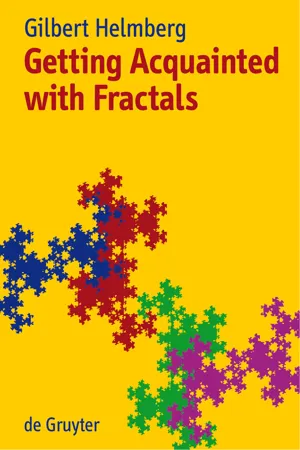
- 177 pages
- English
- PDF
- Available on iOS & Android
Getting Acquainted with Fractals
About this book
The first instance of pre-computer fractals was noted by the French mathematician Gaston Julia. He wondered what a complex polynomial function would look like, such as the ones named after him (in the form of z2 + c, where c is a complex constant with real and imaginary parts). The idea behind this formula is that one takes the x and y coordinates of a point z, and plug them into z in the form of x + i*y, where i is the square root of -1, square this number, and then add c, a constant. Then plug the resulting pair of real and imaginary numbers back into z, run the operation again, and keep doing that until the result is greater than some number. The number of times you have to run the equations to get out of an 'orbit' not specified here can be assigned a colour and then the pixel (x,y) gets turned that colour, unless those coordinates can't get out of their orbit, in which case they are made black. Later it was Benoit Mandelbrot who used computers to produce fractals. A basic property of fractals is that they contain a large degree of self similarity, i.e., they usually contain little copies within the original, and these copies also have infinite detail. That means the more you zoom in on a fractal, the more detail you get, and this keeps going on forever and ever.
The well-written book 'Getting acquainted with fractals' by Gilbert Helmberg provides a mathematically oriented introduction to fractals, with a focus upon three types of fractals: fractals of curves, attractors for iterative function systems in the plane, and Julia sets. The presentation is on an undergraduate level, with an ample presentation of the corresponding mathematical background, e.g., linear algebra, calculus, algebra, geometry, topology, measure theory and complex analysis.
The book contains over 170 color illustrations.
Tools to learn more effectively

Saving Books

Keyword Search

Annotating Text

Listen to it instead
Information
Table of contents
- Frontmatter
- 1 Fractals and dimension
- 2 Iterative function systems
- 3 Iteration of complex polynomials
- Backmatter
Frequently asked questions
- Essential is ideal for learners and professionals who enjoy exploring a wide range of subjects. Access the Essential Library with 800,000+ trusted titles and best-sellers across business, personal growth, and the humanities. Includes unlimited reading time and Standard Read Aloud voice.
- Complete: Perfect for advanced learners and researchers needing full, unrestricted access. Unlock 1.4M+ books across hundreds of subjects, including academic and specialized titles. The Complete Plan also includes advanced features like Premium Read Aloud and Research Assistant.
Please note we cannot support devices running on iOS 13 and Android 7 or earlier. Learn more about using the app